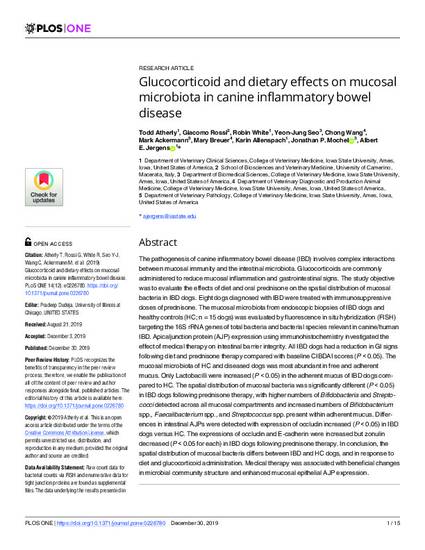
The pathogenesis of canine inflammatory bowel disease (IBD) involves complex interactions between mucosal immunity and the intestinal microbiota. Glucocorticoids are commonly administered to reduce mucosal inflammation and gastrointestinal signs. The study objective was to evaluate the effects of diet and oral prednisone on the spatial distribution of mucosal bacteria in IBD dogs. Eight dogs diagnosed with IBD were treated with immunosuppressive doses of prednisone. The mucosal microbiota from endoscopic biopsies of IBD dogs and healthy controls (HC; n = 15 dogs) was evaluated by fluorescence in situ hybridization (FISH) targeting the 16S rRNA genes of total bacteria and bacterial species relevant in canine/human IBD. Apicaljunction protein (AJP) expression using immunohistochemistry investigated the effect of medical therapy on intestinal barrier integrity. All IBD dogs had a reduction in GI signs following diet and prednisone therapy compared with baseline CIBDAI scores (P < 0.05). The mucosal microbiota of HC and diseased dogs was most abundant in free and adherent mucus. Only Lactobacilli were increased (P < 0.05) in the adherent mucus of IBD dogs compared to HC. The spatial distribution of mucosal bacteria was significantly different (P < 0.05) in IBD dogs following prednisone therapy, with higher numbers of Bifidobacteria and Streptococci detected across all mucosal compartments and increased numbers of Bifidobacterium spp., Faecalibacterium spp., and Streptococcus spp. present within adherent mucus. Differences in intestinal AJPs were detected with expression of occludin increased (P < 0.05) in IBD dogs versus HC. The expressions of occludin and E-cadherin were increased but zonulin decreased (P < 0.05 for each) in IBD dogs following prednisone therapy. In conclusion, the spatial distribution of mucosal bacteria differs between IBD and HC dogs, and in response to diet and glucocorticoid administration. Medical therapy was associated with beneficial changes in microbial community structure and enhanced mucosal epithelial AJP expression.
Available at: http://works.bepress.com/chong-wang/109/

This article is published as Atherly, T., G. Rossi, R. White, Y. J. Seo, C. Wang, M. Ackermann, M. Breuer, K. Allenspach, J. P. Mochel, and A. E. Jergens. "Glucocorticoid and dietary effects on mucosal microbiota in canine inflammatory bowel disease." PLoS one 14, no. 12 (2019): e0226780. DOI: 10.1371/journal.pone.0226780. Posted with permission.